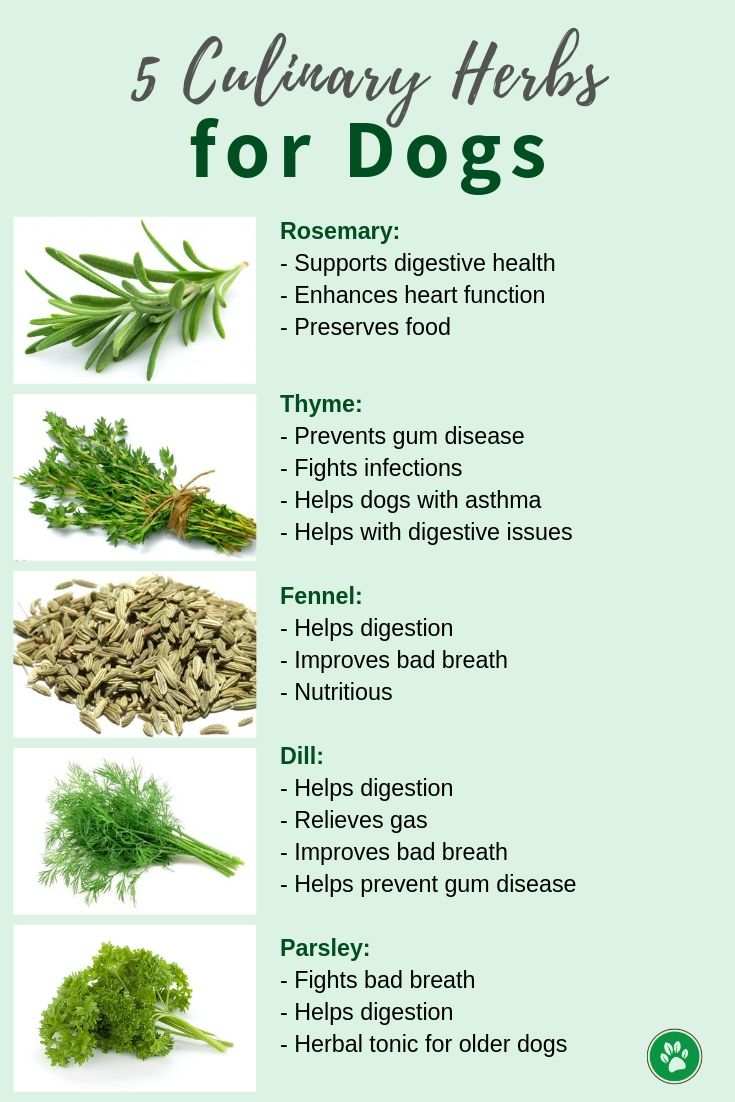Use These 5 Culinary Herbs to Enhance Your Dog's Health
(FTC Disclosure: If you make a purchase via a link on this page, I may receive a small commission, at no added cost to you.)

Overview
Many dog parents wonder if common culinary herbs (such as parsley, thyme, dill) are safe and good for dogs.
The good news is yes - culinary herbs are generally safe to give to dogs (with some exceptions), and they are also nutritious and have quite a range of therapeutic properties.
Used properly, these culinary herbs can help support and enhance a dog's health.
This article takes a look at 5 common culinary herbs and how they can be used to enhance and support the health of our dogs.
Five Culinary Herbs for Dog Health
1. Rosemary (Rosmarinus officinalis)
Rosemary is one of those "versatile" herbs and has numerous medicinal properties. It is antispasmodic, can relieve gas, and can also calm the nervous system.
It is a perfect herb for dogs who have digestive issues (like indigestion, tummy ache, gas, etc.) caused by nervousness or anxiety.
Rosemary's antispasmodic action also works on the heart, making it a good herb for moderating mild irregular heartbeat and enhancing heart function. It is therefore an excellent "heart tonic" herb for older dogs.
To use rosemary to help your dog with digestive issues or as a heart tonic, the best way is to give the dog a tincture of the herb. According to G. Tilford (author of Herbs for Pets), you can give 0.5 ml (about 1/8 teaspoon) for each 20 pounds of your dog's body weight, three times a day.
Rosemary also has powerful antibacterial action. In fact, I am sure you have seen foods preserved by rosemary extract, right? Well, actually it has been found that rosemary is equally effective in preserving foods as some of those more harmful preservatives such as BHA or BHT. If you home cook for your dog and want the food to stay fresh longer, add a quarter teaspoon of dried powdered rosemary to each pound of food.
Safety PrecautionsRosemary is non-toxic to dogs but should not be used with pregnant dogs because the herb contains high amounts of volatile oils that could stimulate uterine contractions.
2. Thyme (Thymus vulgaris)
Thyme has strong antiseptic and antimicrobial properties. It is also antispasmodic and can suppress coughs.
Thanks to these medicinal properties, thyme is useful for helping fight infections in the mouth, the respiratory and the digestive tracts.
If your dog is starting to develop gum disease (e.g. mild gingivitis), or if you want to prevent gum disease in your dog, try using a tincture of thyme for this purpose. Soak a Q-tip with the tincture and gently apply it to the gum lines or problematic areas.
To help dogs with bacterial infections of the respiratory tract (e.g. kennel cough), or dogs with respiratory issues such as asthma, use a tincture of thyme and give a quarter teaspoon per 30 pounds of the dog's body weight, two times daily.
To help dogs with tummy issues such as indigestion, colitis, IBD, simply sprinkle the dried herb of thyme on the dog's food. As a rough guide, add 1 teaspoon of dried herb per pound of food fed.
Safety PrecautionsThyme is non-toxic to dogs but it's better not to give the herb to pregnant dogs due to its high volatile oil levels.
3. Fennel (Foeniculum vulgare)
 Fennel seed is well known for its action on the digestive system. It is antispamodic, "anti-gas", helps digestion, improves bad breath, and is highly nutritious.
Fennel seed is well known for its action on the digestive system. It is antispamodic, "anti-gas", helps digestion, improves bad breath, and is highly nutritious.
This herb can be used to help dogs with digestive issues such as gas, colic, and indigestion.
Say your dog has over-indulged in some delicious yet not-so-digestible human foods, and is now paying the price - He has tummy ache, and is bloated and gassy! If you have a tincture of fennel, you can give him around 10 to 20 drops per 20 pounds of his body weight, as needed.
Alternatively, if you have fennel seeds in your kitchen, you can make a tea for your dog. Add about one teaspoon of fennel seed to 8 oz of boiling water and let it steep for a while until the tea has cooled down. Strain the tea and simply add it to your dog's drinking water (2 to 4 tablespoons of the tea for every 20 pounds of the dog's weight).
Safety PrecautionsFennel is non-toxic to dogs but it's better not to give the herb to pregnant dogs due to its high volatile oil levels.
4. Dill (Anethum graveolens)
Dill is another culinary herb that has great affinity with the digestive system. Like fennel, dill is antispasmodic, anti-gas, antibacterial, and very nutritious.
If your dog is suffering from indigestion, you can make a dill tea and feed it to your dog. Simply add one teaspoon of dill seed to 8 oz of boiling water and let it steep until cool. Strain the tea and add it to your dog's drinking water (2 to 4 tablespoons of the tea for every 20 pounds of the dog's weight).
Because of its antibacterial properties, dill is also great for improving your dog's bad breath, especially when combined with parsley and peppermint.
Though not as strong as thyme, a tincture of dill can be used to prevent or help treat mild cases of gingivitis in dogs.
Safety PrecautionsDill is non-toxic to dogs but it's better not to give the herb in large amounts to pregnant dogs due to its high volatile oil levels.
5. Parsley (Petroselinum crispum)
Parsley is another common kitchen herb that you can use to help enhance your dog's health.
This herb can improve your dog's bad breath, helps dogs with various health problems, such as digestive issues, urinary issues, arthritis, and anemia. It is also a good tonic herb for older dogs.
Read my article on parsley benefits to dogs for more information on how to use this herb to help enhance your dog's health.
Herbs and Essential Oils
With so many health benefits that these 5 culinary herbs have to offer, many dog parents wonder if the essential oils of these plants are just as beneficial. More importantly, they want to know if these oils are safe to use on dogs.
Understand that essential oils are much more highly concentrated than herbal teas or even tinctures, so more care has to be exercised when it comes to using essential oils, either on dogs or on people.
As with any other essential oils, the essential oils of these 5 herbs should NOT be given to dogs orally.
Topically, you could use diluted rosemary essential oil on dogs (with the exception of pregnant dogs and dogs with epilepsy) for pain relief and respiratory support. However, personally I would avoid using this oil on dogs simply because there are other milder and safer alternatives for these purposes.
There are various chemotypes of thyme essential oil, and the only chemotype that is safe to use topically on dogs is Thyme ct. linalool.
Thyme ct. linalool has pain relieving properties, and can be added to a blend to help dogs with arthritis, rheumatism, or other joint pain.
Additionally, thyme ct. linalool has powerful antibacterial, antifungal, and antiviral properties. It is an excellent choice for infections and other skin issues.
While the essential oil of fennel is effective in relieving digestive issues, it contains a component that has estrogenic effects, making the oil unsafe for use with pregnant and lactating dogs. Moreover, the component is potentially toxic to the liver and may inhibit blood clotting. As such, I would avoid using fennel essential oil even topically on dogs, and use the milder herb instead.
The essential oils of the other two herbs (dill and parsley) should not be used on dogs as they contain a chemical component that is found to be toxic to the liver, kidneys, heart and digestive system. Once again, AVOID these two essential oils and stick to the herbs.
J.A. Duke, The Green Pharmacy Herbal Handbook: Your Comprehensive Reference to the Best Herbs for Healing (Rodale Books, 2000).
R. Kidd, Dr. Kidd's Guide to Herbal Dog Care (Storey Publishing, 2000).
M.L. Wulff-Tilford and G.L. Tilford, Herbs for Pets (Bowtie Press, 1999).





